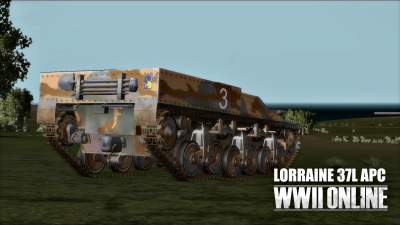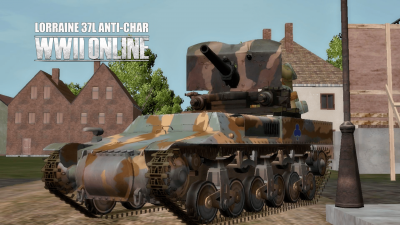Lorraine 37L
Lorraine 37L
History

| |
| Lorraine 37L | |
| Specifications | |
| Type | Armoured Personal Carrier |
| Crew | 1 (Driver) |
| Weight | 6,00kg |
| Top Speed | 35km/h |
One lesson of WWI was that faster, better-protected supply movement was needed to forward units on quagmire battlefields. Germany developed halftracks for this job. France chose to go with specialized all-wheel-drive trucks, and full-track supply movers. The Lorraine 37L was designed for this supply movement job.
France's pre-WWII army, much like the British army, was divided into Infantry and Cavalry arms. The Cavalry and Infantry each had their own tank elements, and separately developed and bought their own armaments and vehicles. The 37L was intended to pull a fuel trailer and haul ammo, engine oil and other critical supplies for tanks on the battlefield, including the Infantry's Renault B1 / B1 bis and Renault R35 / 40 types and the Cavalry's SOMUA S35 / 40 and Hotchkiss H35 / 39. The Infantry and Cavalry didn't often place orders for the same weapon or vehicle, but that happened with the 37L.
The 37L was never intended for troop movement or gun towing, or to serve as the chassis for SP gun developments, though all of those did occur once hostilities began. But, it became apparent to the French Army and to the Lorraine company in the late 1930s that troop movement on the next war's battlefields would present many of the same problems as supply movement, and a better "armored personnel carrier" (APC) design was needed. As a stop-gap measure, Lorraine developed the 38L, which was used in the 1940 fighting, and then later prototyped the futuristic 39L which would have entered production in July or August, 1940.
The 37L supply tractor version made an important contribution via its excellent balance of mobility, ruggedness, capacity, small size, and enough protection against bullets and fragments for its multiple roles.
Game Play
In WWII Online, the 37L can carry up to 6 soldiers in its rear compartment, tow guns, set Mobile Spawn Points and dump crates of supply for the fighting units. Its low profile makes it ideal to navigate low terrain and easily hides behind berms, safe from anything but strikes from above. It is however rather slow, at some 20 kmh cross-country and around 35 kmh on roads.
The driver may open his front hatch by pressing o (Open).
Lorraine 37L Anti-Char
History

| |
| Lorraine 37L Anti-Char | |
| Specifications | |
| Type | Armoured Personal Carrier |
| Armament | 47mm SA 37 |
| Crew | 3 (Driver, commander, Gunner) |
| Weight | 6,00kg |
| Top Speed | 35km/h |
Warfighting tactics, weapons and vehicles sometimes evolve in ways that senior leaders don't see coming. Nations that don't correctly "predict the future" must quickly adapt.
One early lesson of WWII was that towed AT guns rarely were in the right place and frequently were lost during much-faster-than-anticipated battlefield shifts, and self-propelled guns were much more effective.
The Lorraine 37L tank hunter, combining a lightly modified 37L vehicle with the powerful Mle1937 47mm AT gun, was developed quickly in May, 1940 in response to desperate requests from front-line units for ways to increase their defensive mobility. This weapon/vehicle combination was a factory adaptation of existing equipment; limited numbers were built and utilized in the historical 1940 fighting, but no doubt many more would have been built as fast as the factories could turn them out.
Game Play
In WWII Online, the Lorraine 37L Anti-Char makes an excellent ambush/interdiction vehicle and can go toe to toe with any contemporary opponent if kept hull down and well away from enemy infantry. While it hits hard it is extremely vulnerable to fire from behind and above, and anything of Panzerbuchse calibre or greater will cut right through its thin armour.
Be advised however that despite its diminutive size and excellent camouflage you WILL have to displace - that is, move to a new location - at once after your first engagement. The enemy will quickly learn of your position and send swift retaliation your way, be it infantry, scout cars or aircraft. The wise operator knows when the game is up and moves to a new covered position, preferably one that overlooks the old site so as to deliver another ambush on the revenge crew.